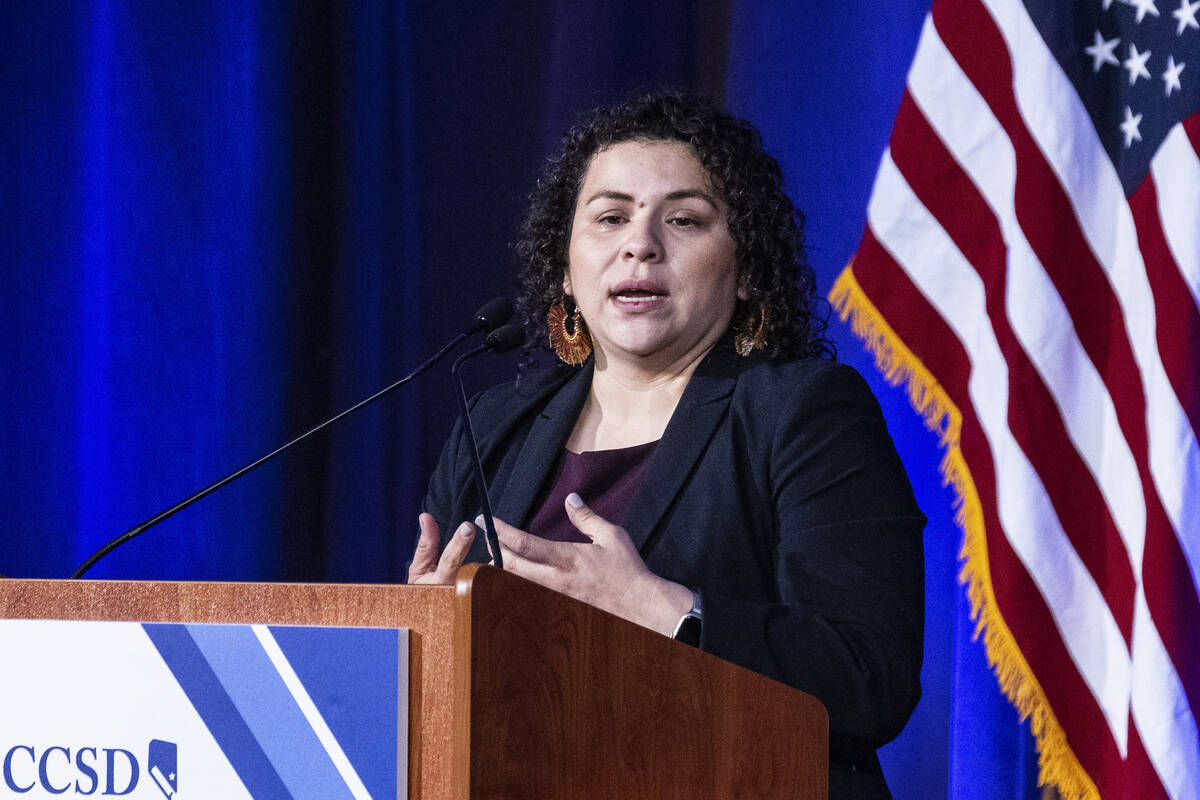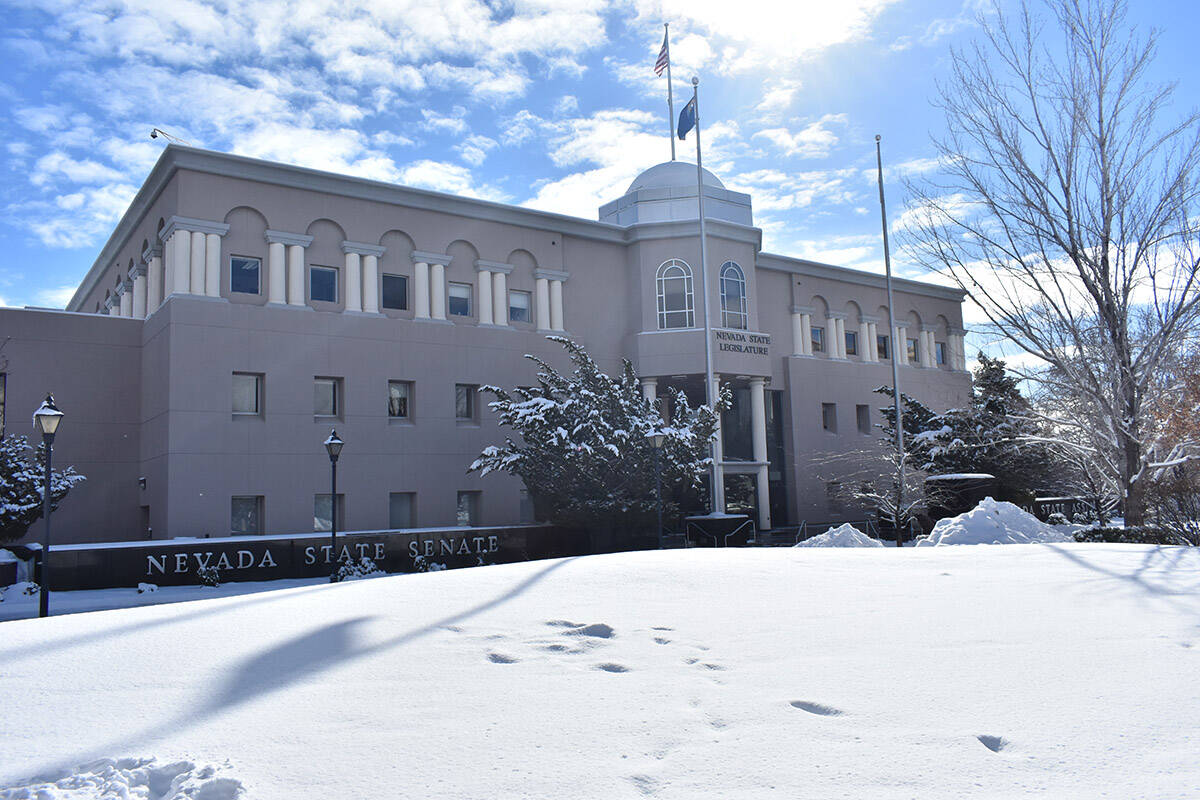School trustee standards up for debate in Carson City
Newly elected Gov. Joe Lombardo put the state on notice last week that changes to school governance will be possible if Nevada’s flagging public school system doesn’t produce improved results in the next two years.
But members of the Legislature and school district leaders are already looking to take up that mantle during the upcoming legislative session by proposing changes to how school board members are selected and what training is required before they even run for office.
The Clark County School District has introduced Senate Bill 65, a bill that would require background checks and training for school board candidates before they file to run, as opposed to after they are elected.
The district’s board of trustees voted in August to request a bill draft that would establish standards for education-related oversight boards, with Trustee Lola Brooks anticipating at the time that there could be several bills introduced this session related to school board oversight because of the board’s bad reputation.
“…we should probably have a seat at the table,” Brooks said at the time. “I think it’s very important for people to recognize that the people who are most versed in the problematic natures of serving on a board are (members of those) boards, so I think it’s important for us to engage in that conversation and (for) us have an active role.”
Despite supporting more training for elected officials, the chair of the Assembly’s Education Committee questioned whether the bill was putting the cart before the horse.
Assemblywoman Shannon Bilbray-Axelrod, D-Las Vegas, said she was unsure whether the Legislature would have the ability to change eligibility requirements exclusively for school board offices.
“I’m not even sure we could do that,” Bilbray-Axelrod said. “It’s very clear on what qualifications you have to have.”
Qualifications for office
District spokesperson Tod Story compared the training to the prerequisites required for offices such as judges, sheriffs or constables. Under the bill language for SB 65, the state Department of Education would have to identify an organization to perform the training for school board candidates.
Bilbray-Axelrod acknowledged that there have been several concerns raised by community members regarding how school boards are run, but said the proposal from the Clark County School District only touches on one leg in the larger stool of concerns.
But another bill sponsored by former Lt. Gov. Lisa Cano Burkhead could also change the makeup of school boards by taking them from an all-elected board to a hybrid model of elected and appointed members.
Cano Burkhead’s bill, Senate Bill 64, proposes having at least one appointed member on each Nevada school board and requires legislative audits of each school district in the state at least once every five years. However, after Cano Burkhead lost her re-election bid for lieutenant governor to Republican Stavros Anthony in November, the bill’s future is questionable.
But the head of the state’s largest teacher’s union said his organization still plans to take up the issue this session.
‘Theater of dysfunction’
John Vellardita, executive director of the Clark County Education Association, told the Review-Journal the union wants to see changes to the state’s school board governance structure, which he described as a “theater of dysfunction.”
“It clearly suggests that we probably need to add some other voices that keep the discourse professional, that keep a real focus on student outcomes, which we think has been missing,” he said.
Cano Burkhead said in October that she had filed the bill request to ensure that school boards had more education experts acting in the best interests of our students, a sentiment that Vellardita agreed with, he said. The recent performance by the school board in Clark County suggests that there should be other voices on the board keeping discourse professional and with a focus on student outcomes, he said.
Under SB 64’s current language, each county commission and incorporated city in the county with 60,000 or more residents would appoint a trustee to serve on the board, in addition to its elected trustees. In Clark County, that would mean four additional trustees for the seven-member board: one appointed by the county and one appointed by the cities of North Las Vegas, Las Vegas and Henderson.
But past attempts to implement similar legislation have been met with pushback from school leaders and community members who have argued that constituents should have the right to choose their representatives.
‘Democracy working’
At a meeting last summer where Nevada legislators solicited feedback from the community about how school board members are chosen, policy analysts with the Education Commission of the States found that a vast majority of school boards across the country elect their members.
Chris Daly, with the Nevada State Education Association, said his union feels strongly that democratically elected school boards deliver the greatest levels of accountability and community responsiveness.
Daly acknowledged there have been issues with the Clark County School District in recent years, but said those challenges haven’t been unique when compared with school districts around the country, particularly for a large urban district in a state that he said chronically underfunds public education.
Daly also pointed to two of the union’s endorsed candidates – Linda Cavazos and Brenda Zamora – winning election to the school board in November. “Right there you see that democracy working,” he said.
But the third candidate to win election to the board, former Assemblywoman Irene Bustamante Adams – who Bilbray-Axelrod called a “laser focused” leader who would bring a sense of calm to the board – was endorsed by the rival Clark County Education Association.
Vellardita, with the Clark County association, said that some in the school community were in denial about how the school board has been performing in recent years. Vellardita reiterated that a majority of members on the board should still be elected, but that appointees could bring a skill set and experience to the governance of the educational body.
“I think we’ve seen there’s evidence out in the community that people aren’t happy with the governance,” he said.
In his State of the State address Monday, Lombardo announced a $2 billion investment for public schools, but also said he wouldn’t accept a lack of funding as an excuse for underperformance. “…if we don’t begin seeing results, I’ll be standing here in two years calling for systematic changes to the governance and leadership in K-12 education,” he said.
Lombardo told the Review-Journal Wednesday that local school boards have had significant issues with addressing curriculum and allocating funds due to inexperienced board members. Lombardo said it was important to preserve voters’ voices in the electoral process, but said he was open to considering more qualifications for board candidates and a hybrid board model, similar to the State Board of Education.
“We’ll see how the money that I proposed and upon approval of the Legislature gets managed this coming biennium,” he said.
Vellardita said that, in the wake of Lombardo’s promise to invest $2,000 more per pupil in public school funding, now was the time to improve how school districts are governed.
“He’s clearly given us even more reason to try to get some changes in the session,” Vellardita said.
Lorraine Longhi at 702-387-5298 or llonghi@reviewjournal.com. Follow her at @lolonghi on Twitter.



















